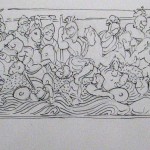
As promised, here are some additional thoughts on Amy Waldman’s The Submission. Our book club discussion on this novel was among our liveliest, and we agreed that this is an outstanding work of contemporary fiction. We found the characters authentic and their conflicts generated much important thinking for the reader.
Our conversation centered primarily on Mo, Claire, Asma, and Sean, and if their behavior was consistent with what they believed to be their core values. In the case of Mo and Claire, the actions they take find them both alone and isolated twenty years after the contest. It is hard to know, however, if their lives would have wound up much differently had they not found themselves in the 9/11 maelstrom. Asma and Sean, on the other hand, took more dramatic action: Asma loses her life, Sean loses his family–but they both fulfill a need to be true to themselves.
This novel forces the thoughtful reader to confront her own biases and challenge herself to ask the hard questions. And as Tom Junod of Esquire magazine writes:
“The Submission is not a religious novel but rather a secular one that takes religion very seriously. It is not a political novel but rather a novel about the ongoing redefinition of the place where politics starts. It is a novel of large public concern, and yet what it suggests is that over the last decade “the public†in America has just become an excuse for “the private†to hold sway — for people to submit to impulses they didn’t know they had. It is a portrait of a country almost terrifyingly free and at the same time endlessly involved in the task its title describes: either trying to get up off its knees or fall down to them.”
Indeed, The Submission does force these questions and unsettles the reader in an important and significant way, and that is precisely why this is a must read for smart women.
If you haven’t read the novel yet, the descriptions below give you a good sense of the cast as provided by the author on her site www.thesubmissionnovel.com
Mohammed Khan: The Architect
Every day brought more proof that the attackers were Muslims, seeking the martyr’s straight shot to paradise—and so Mo braced for suspicion as he returned to the theater under construction. A few days later he realized that the difference wasn’t in how he was being treated but in how he was behaving. Customarily brusque on work sites, he had become gingerly, polite, careful to give no cause for alarm or criticism. He didn’t like this new, more cautious avatar, whose efforts at accommodation hinted at some feeling of guilt, yet he couldn’t quite shake him. Read more

